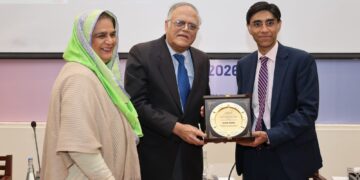BY : Ehtisham Chohan
Student, Shaheed Zulfikar Ali Bhutto Institute of Science and Technology (SZABIST)
Email: johndavidyeshua676@gmail.com
Karachi : It has long been believed that music is a universal language that transcends linguistic, geographic, and
cultural barriers. Its ability to unite individuals from diverse origins is remarkable. In ways that words frequently cannot, music brings people together. Music has a significant role in fostering cultural unity. One of the main reasons music unites individuals from different cultures is its universal appeal. Music transcends linguistic boundaries, in contrast to spoken language, which frequently hinders communication between individuals from different backgrounds. A song performed in one language may inspire listeners who are moved by the melody or rhythm but not the lyrics. Without requiring translation, music is an excellent medium for expressing feelings.
For example, the recent release of Coke Studio season fifteen’s song “Piya Piya calling” contains seven wonderful languages, including: spanning Norwegian, Arabic, English, Urdu, Farsi, Gujarati, and Balochi. Which connects people together from all over the world without language being a barrier and music being a banger. People from a wide range of ethnic backgrounds can interact and share a similar experience at music festivals. More than just the performances, these festivals aim to unite people in their appreciation of dance, music, and the arts. As people enjoy the moment, cultural barriers are often melted down at these gatherings. Our musical partnership with India, our neighbor, is the most prominent example. Another way that music fosters cultural harmony is through collaborations between musicians from various origins. Due in large part to social media and the internet, cross-cultural partnerships have become more and more prevalent in recent years. These partnerships usually blend musical traditions, instruments, and genres from various countries, creating distinctive
Additionally, music is crucial to the dissemination and preservation of cultural traditions. Many cultures
rely heavily on folk music, traditional instruments, and indigenous rhythms to transmit stories, values,
and history from one generation to the next. People from different origins learn more about their
unique histories and beliefs when they come together to enjoy and learn about each other’s musical
traditions.




















